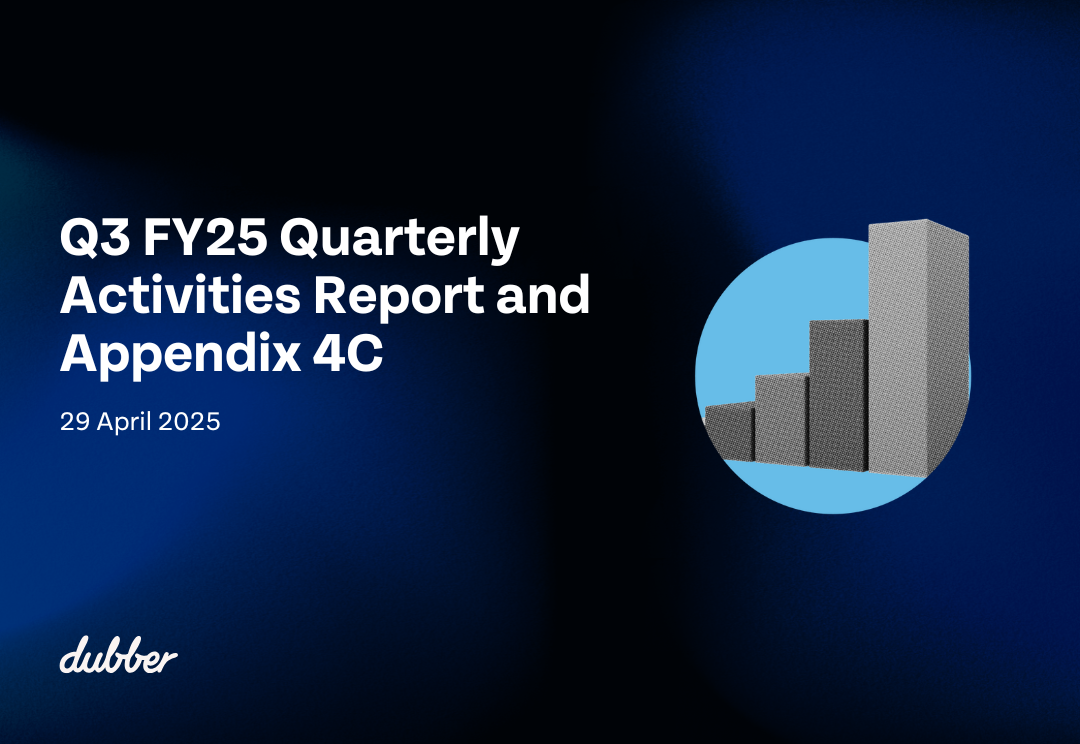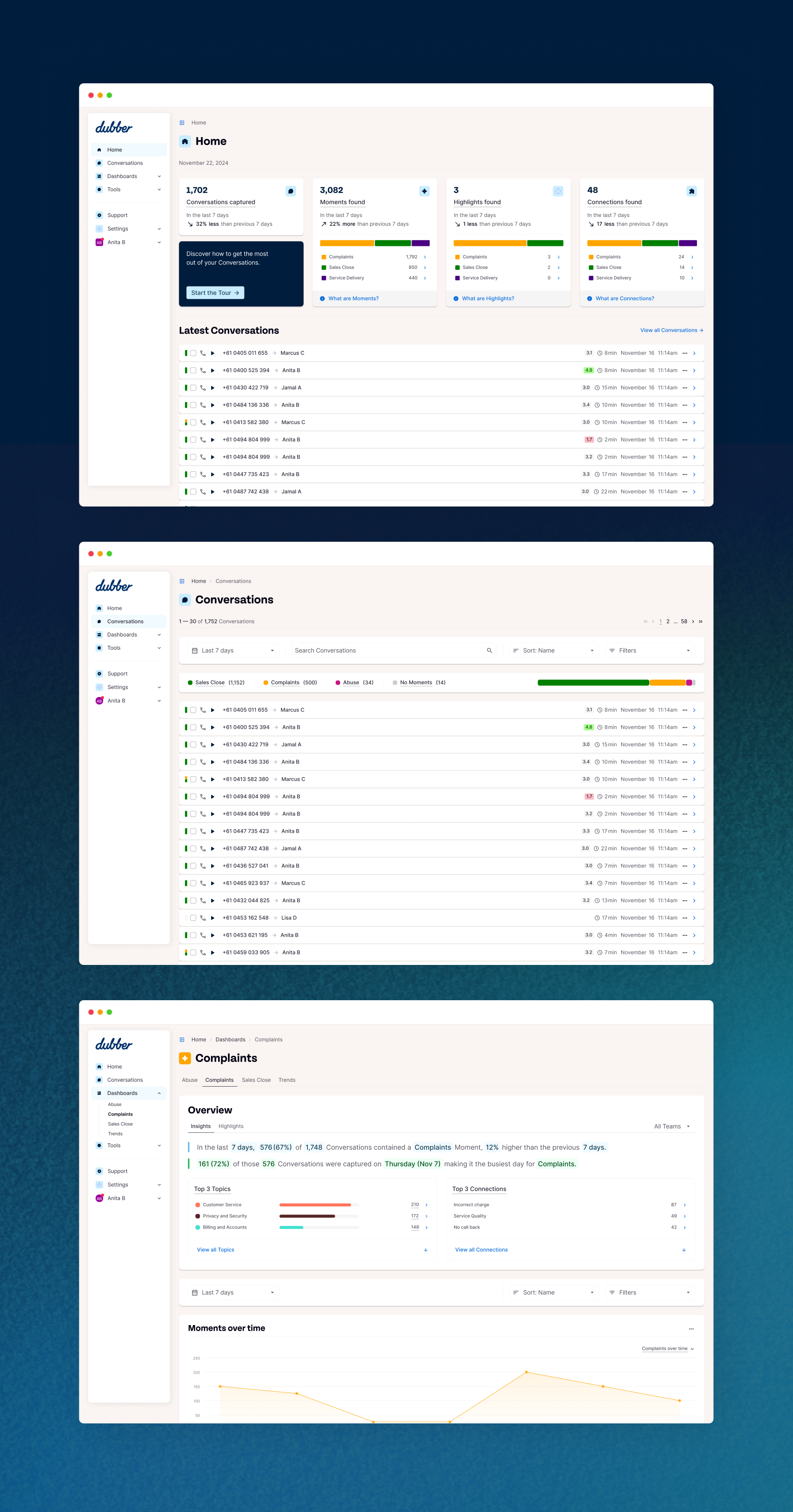
In Financial Services, every client interaction is a transaction in reputation, trust, value, and compliance. As conversations shift across mobile, video, and voice, many banks lack insight into what is said in the moments that build or break client relationships. Dubber is changing this by capturing and analysing every interaction, and providing actionable intelligence that transforms conversations into strategy, performance, and protection.
Strengthen Controls in High-Risk Selling
Private banking teams are using Dubber’s conversation intelligence platform to gain immediate insight into how financial products are positioned, discussed, and received during conversations. Teams can see who is selling which products and whether each sale meets the relevant regulatory standards and internal policies, providing oversight without disrupting workflows. Misstatements and mis-selling risks are flagged in real-time, while effective communication strategies can be identified to be coached and shared across teams. This visibility is helping banks stay closer to their clients and maintain better control in increasingly complex business environments.
Managing Complaints in Line with Industry Regulations
When handling complaints, private banks using Dubber no longer need to rely on recollections or summaries. We eliminate ambiguity by linking each complaint to the product, service, and recorded conversation for full compliance with any regulatory standards. This allows for faster, more transparent resolutions supported by compliant, evidentiary data that can be used in internal and external audits and reviews. Beyond complaint resolution, banks are leveraging these insights to find patterns in client feedback and make improvements to messaging, service, and product delivery.
Supporting Client-Facing Teams
Dubber is helping private banks create safer and more supportive environments by detecting and escalating instances of verbal abuse, aggression, or inappropriate conduct. These insights allow banks to support their staff and reinforce behavioural standards to navigate high-pressure and sensitive conversations.
By delivering deep insight into sales effectiveness and client needs, we help reduce compliance risks, improve client outcomes, strengthen team performance, and become a more trusted institution.
Let Dubber turn your banking operations into a valuable asset. Contact us to learn more: contactus@dubber.net

Melbourne, Australia: Dubber Corporation Limited (ASX:DUB) the leading conversation capture and intelligence platform for service providers and their customers globally, today released its Q3 FY25 quarterly report.

Valuable conversations happen across your organisation every day. From sales calls and customer service interactions to HR check-ins, these touchpoints are filled with insights that often go unrecorded, unanalysed, and underutilised. Dubber helps small and medium businesses capture and transform these everyday conversations into actionable business intelligence that is driving growth, smarter decisions, and stronger relationships.
Improving Sales by Listening
Customer conversations contain signals about what people are buying, what they want next, and what competitors they may be considering. With Dubber, businesses are able to tap into these insights. By automatically capturing calls and applying AI to highlight key moments, sentiment, objections, and questions, sales leaders can use real calls to coach teams, refine messaging based on proven success, and react quickly to shifting customer priorities. Listening to conversations at scale enables SMBs to build sales strategies based on real-world behaviour for higher conversions, a stronger pipeline and better customer relationships.
Analysing Complaints for Advantage
When customers voice pain points or provide feedback, they offer a roadmap to improvement. Trends across conversations can reveal what traditional surveys miss, such as shifts in sentiment, recurring issues, and unmet or emerging needs. These insights are uncovered by analysing calls at scale, where repeated themes and tones surface over time through Dubber’s AI-powered analysis. By identifying these patterns in complaints, SMBS can support their teams with the insights needed to drive product enhancement, improve marketing campaigns, implement policy changes, and create customer engagement strategies.
Building a Culture of Accountability
Dubber provides businesses the ability to analyse internal conversations in a way that supports growth, not surveillance. By creating an environment where expectations are clear and interactions are reviewable, businesses are empowered to build accountability into daily operations to support fair conflict resolution, strengthen leadership values, and encourage teams to collaborate effectively.
SMBs using Dubber are growing revenue, retaining more staff and customers, and making smarter decisions by acting on the key topics already being discussed within their businesses. Dubber records conversations, and surfaces the insights that are hiding in plain sight, delivering measurable impact without adding complexity to your day.
Contact us to learn more: contactus@dubber.net

With trusted data and responsible, advanced intelligence powering every insight, Dubber is equipping organisations across industries to extract meaningful, accurate, and traceable information that delivers immediate business value.
Extract Trusted Insights from Your Data
Trust is the foundation of any effective intelligence platform. Without reliable data, AI becomes unpredictable, and can introduce risk rather than reduce it. At Dubber, we’ve built our AI powered insights so that every data point can be traced, verified, and acted on with certainty.
Our patented technology gives us full control over how your data is captured, processed, and protected. This means we can capture the most valuable information from your conversations in ways that are fully auditable and transparent. With the ability to trace the source of any insight in just three clicks, you can see exactly where the data came from, how it was processed, and how insights were extracted. This level of visibility builds business confidence, because when you understand your data, you can trust the decisions it informs.
Using AI with Responsibility
As AI becomes widely embedded across customer service, compliance, and operations, businesses have a duty to ensure it’s used ethically and responsibly, with full transparency and human oversight. At Dubber, our AI is continuously refined, trained, and reviewed by our expert team who understand the business outcomes it supports for fairness, relevance, and accuracy at every stage.
The Dubber platform is deployed with the highest standards of quality, security, and compliance aligned to global data protection and AI ethics. Through responsible AI, businesses gain the ability to drive sustainable growth without compromising on trust or integrity, delivering advanced voice intelligence that is as responsible as it is powerful.
When your AI is responsible, your data becomes trustworthy and when your data is trusted, your insights become powerful. We’re committed to delivering solutions that you can trust. Contact us here for more information: contactus@dubber.net

We’re excited to announce that the new and significant upgrades are now live on the Dubber Platform! These enhancements are designed to make your Dubber user experience even more powerful, with deeper insights, and expanded AI capabilities – right at your fingertips.
Available immediately, all Insights & Trends customers can effortlessly gain even more value from their conversations, for smarter decisions, strengthened compliance and risk mitigation, and a greater understanding of your customer than ever before.
The new Dubber experience
No Setup Required – Immediate Value
Even with all the improvements, there’s still no complex setup or configuration needed- simply turn it on and start gaining insights, immediately.
Self-Learning AI – Smarter Over Time
Our AI continuously learns from your conversations, refining its understanding of your business, delivering enhanced insights specifically tailored to accelerate decision-making, and driving smarter customer and business outcomes.
Proactive Notifications – Stay Informed
Get weekly notifications and updates on trends, like patterns, shifts, and signals that matter, so you never miss key insights.
Seamless Integration – Works Where You Do
Unlock greater value from your data with Dubber’s enhanced APIs. Seamlessly integrate recordings, insights, and metadata into your existing business workflows, tools, and platforms.
Enhanced Reliability – Trusted, Actionable Intelligence
Improved platform security and reliability deliver accurate, meaningful insights tailored to your business needs, now reinforced by Multi-Factor Authentication for even stronger access control and data protection.
What these upgrades mean for you
All customers on our AI plans can now experience these business intelligence upgrades for:
- More powerful analytics across all Dubber Moments
- Deeper insights into business intelligence and behavioural analytics
- Increased confidence in data-driven decision-making for immediate business impact
- Enhanced conversation actions for precise record-keeping and improved efficiency
These upgrades are just one part in our commitment to delivering world-class, cutting-edge solutions to our current and future partners. With our dedicated AI team driving constant innovations and advancements, we remain focused on empowering our users with intelligent, actionable insights.
To learn more about what these upgrades mean for you, email us at contactus@dubber.net.

Marketing strategies and campaigns are designed to capture attention and influence buying decisions, but traditional metrics like clicks and impressions measure only part of their impact. The key value lies in understanding customers’ sentiment, hesitations, feedback, and intent. Every conversation with current or prospective customers is filled with valuable insights for growth, and by listening and analysing these at scale, businesses gain immediate insights to refine marketing strategies for greater effectiveness.
Analyse how your marketing efforts are performing
Businesses are already finding value with Dubber, seamlessly capturing customer conversations at scale to track and evaluate marketing performance.
“Dubber has given us the ability to quickly assess if our promotional campaigns are actually resonating and connecting with customers and if they are contributing to positive sales and business success.”
– Marketing Director at a Leading Automotive Company
Using our patented, award-winning AI technology, Dubber provides visual insights into which products and services are being discussed, monitors customer sentiment (are they excited, disappointed, or confused?), and correlates feedback with actual sales and product performance. This provides businesses deeper insight into how messaging is being received and if its driving conversions, allowing them to adjust and launch future campaigns for success, based on real conversations and data.
Use customer insights for business growth
Dubbers real-time insights helps you understand what’s happening in sales conversations with feedback that goes beyond survey responses and engagement metrics.
Customer Interactions provide crucial insights into brand perception, conversation patterns, product-market fit, and emerging trends. By analysing these conversations, businesses can recognise unmet needs that otherwise go unnoticed and strengthen their product or service messaging. By identifying where sales are stalling, due to pricing hesitations, unresolved objections, or ineffective messaging, Dubber gives you the ability to refine your strategies to improve sales performance and revenue.
Dubber’s AI-driven solution helps businesses measure their marketing performance by turning discussions into data-driven decisions. To learn more about how Dubber delivers results across any industry, get in touch with us at contactus@dubber.net.

We are excited to announce a major new addition to Dubber’s capture capabilities: the ability to record voice recordings from Zoom Contact Centre! This enhancement is another significant step forward as we continue to grow our footprint in the Contact Centre and Conversation Intelligence market.
This latest addition to our product suite builds on our existing integrations with Zoom Phone and Zoom Meetings, further establishing Dubber as a leader in delivering seamless, scalable, and reliable recording solutions and directly expanding our addressable market. By leveraging Dubber, contact centres can transform every conversation and interaction their agents are having into actionable intelligence – automating compliance, improving agent performance, and gaining valuable customer insights for business growth.
Other Updates
In recent months, we’ve also rolled out updated voice recording solutions for Amazon Connect and Webex Contact Centre, solidifying our position in an industry experiencing unprecedented growth. This enhancement expands Dubber’s extensive coverage, which already includes leading platforms such as Microsoft Teams, BroadSoft, Cisco Webex, and RingCentral,
The global contact centre market is thriving, with key players like Amazon Connect, Webex Contact Centre, Microsoft Dynamics 365, and Zoom Contact Centre all driving demand for intelligent voice recording solutions. Dubber is uniquely positioned to help businesses deliver unparalleled value through enhanced compliance, reduced costs, increased productivity, customer experience, and business intelligence.
Our commitment to continuous innovation means we’re constantly advancing what Dubber can offer: delivering more powerful insights, seamless integrations, and positioning ourselves as a trusted and leading partner for businesses navigating the future of customer service.
With our expanded capabilities and ongoing innovation, Dubber is here to help your contact centre drive transformative outcomes.
Contact us to learn more: contactus@dubber.net

Automotive dealership success relies on providing quality vehicles and parts, along with delivering valuable customer experiences. Dubber helps dealerships prioritise exceptional service by understanding customer needs and streamlining sales processes leading to improved customer loyalty, higher conversion rates, and increased repeat business.
Increase Sales Performance with Tailored Customer Conversations
Each conversation is an opportunity to address customer needs and move towards closing a sale. With analysis overview information and comprehensive insights of conversations like sentiment monitoring, Dubber supports dealerships in identifying key opportunities to maximise engagement and sales conversion success.
For example, during customer inquiries, dealerships can pinpoint exact moments where a small, yet crucial, action such as confirming a specific showroom booking time or test drive, can significantly increase the likelihood of securing an appointment. And when financial constraints are preventing a sale commitment, Dubber can quickly flag this for staff to offer targeted solutions like coupons, or financing options. By revealing unseen and data-driven opportunities, dealerships create a more proactive sales process, increase showroom visits, and provide immediate value to the customer.
Address Concerns and Provide Better Service
Addressing service queries go beyond finding the solution, but also informing customers and managing their expectations. By leveraging fact-based data, dealerships can streamline and strengthen customer interactions with consistent, proactive communication.
With Dubber, automotive dealerships can be notified when a key gap in communication is identified during the servicing process, such as when customers are not receiving timely status updates or next steps, especially in workmanship complaints. By providing clear information of when they will be contacted again or how long a resolution will take, dealerships can improve customer confidence, satisfaction and service experience.
By leveraging Dubber, dealerships gain a powerful tool that turns every conversation into an opportunity to improve the service experience for both the dealership, and the customer.
For questions or to learn more, contact us here: contactus@dubber.net.

We’re excited to unveil a series of powerful updates coming to the Dubber Platform in the months ahead! These enhancements will redefine the user experience, providing deeper insights, improved analytics, and expanded AI capabilities—helping you and your customers unlock even greater value from every conversation.
What’s Changing?
By the end of this month, all customers on our AI product plans will gain access to significant upgrades in business intelligence. Whether you’re using Dubber Insights, Unified Capture + Insights, or Dubber Recording + Trends, you’ll soon experience:
- More powerful analytics across all Dubber Moments
- Enhanced business intelligence for deeper insights
- Greater confidence in data-driven decision-making
These improvements empower you to extract meaningful trends, optimise operations, and maximise the value of your captured conversations.

But That’s Just the Beginning!
In addition to advancing our out-of-the-box business intelligence capabilities, we’re rolling out enhancements across our standard AI features, including:
- Upgraded Conversation Highlights – Instantly pinpoint the most critical moments within your conversations, now with improved accuracy and detail across all AI products.
- Advanced Sentiment Analysis – Gain a more nuanced understanding of conversation sentiment, now with speaker-specific sentiment breakdowns.
- Streamlined Conversation Actions – Keep track of key action items from every discussion, ensuring nothing slips through the cracks.
More to Come for Voice Recording Customers
We’re also working on an exciting roadmap of additional enhancements for our voice recording solutions, set to launch later next quarter. Stay tuned for more details on these upcoming innovations that will further enhance the Dubber experience.
We can’t wait to show you these improvements and discuss how they can elevate the value you’re delivering to your customers—empowering them to capture, understand, and act on their most valuable conversation data like never before!
Watch this space for more updates!

Healthcare systems are under constant pressure to do more with less. Dubber’s AI-powered insights are designed to maximise efficiency and customer service operations in healthcare, for smoother care coordination and stronger patient relationships.
Drive Productivity and Operational Performance
Amid budget cuts and growing regulatory demands, healthcare providers face challenges to deliver quality care while adhering to internal and external duty of care standards, such as HIPAA and GDPR.
Dubber can help ease these burdens by better organising patient consultations, tracking sales activities, and providing in-depth data on patient history and preferences. By providing healthcare providers with immediate and actionable insights, we ensure compliance with regulations while enabling informed decision-making that improves care efficiency. This not only drives the performance of teams, but also leads to better patient outcomes and maximised care delivery effectiveness, for both operational success and patient satisfaction.
Enhance Productivity of Sales Teams
Healthcare sales teams engage with vast networks, and with Dubber’s conversation intelligence this helps them sell smarter. AI-driven insights surface key signals, track objections, and refine messaging. Automated summaries, conversations actions and sentiment analysis reduce admin work. With full visibility into performance trends, teams close deals faster and more effectively.
Improve the Staff and Patient Experience
Improving the patient experience starts with understanding their needs. Our AI tools immediate feedback on patient interactions, allowing healthcare providers to address any concerns quickly. By compliantly identifying trends in patient complaints and identifying moments of positive engagement, Dubber supports a healthcare provider delivering tailored care that builds trust and strengthens relationships with patients. Additionally, by offering insights into staff interactions and workloads, healthcare teams can better manage stress and balance responsibilities, fostering staff wellbeing and their ability to deliver compassionate, high-quality service and care.
With Dubber’s solutions, healthcare providers can optimise internal processes, whilst strengthening customer service and patient experiences.
For questions or to learn more, contact us here: contactus@dubber.net.
